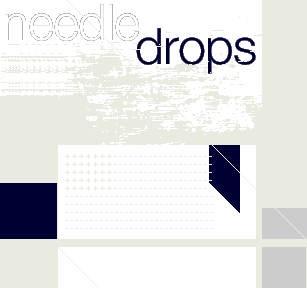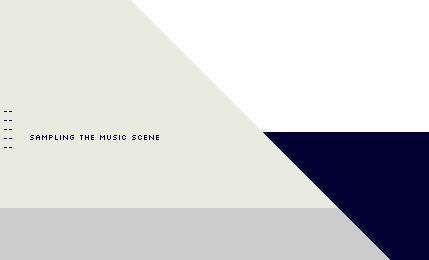


++ Contact Philip Sherburne ++
++ Recently ++
Tuesday, November 29, 2005 = The Stooges Unearthed (Again)
Tuesday, November 8, 2005 = Documenting Beulah And DCFC
Tuesday, November 1, 2005 = Out-Of-Control Rock 'N' Roll Is Alive And Well
Tuesday, October 25, 2005 = Just In Time For Halloween
Monday, October 3, 2005 = The Dandyesque Raunch Of Louis XI
Monday, August 15, 2005 = The Empire Blues
Tuesday, August 9, 2005 = David Howie's Sónar Diary
Monday, July 25, 2005 = Hot Sounds For Summertime
Monday, June 27, 2005 = Overcoming Writer's Block At Sónar 2005
Monday, June 4, 2005 = Cool New Sounds To Download Or Stream
++ Needle Drops Archives ++
View full list of Needle Drops articles...
|
|
 |
September 14, 2001
++ On The Internet, What Does 'On-Topic' Mean?
The publishing schedule for "Needle Drops" means that I typically
write the columns on Tuesday, to allow time for copy-editing and
fact-checking before Friday morning's posting. To say that this
week's Tuesday was unusual is beside the point: readers all over the
world will by now have heard reports and seen images from the
destruction of the World Trade Center towers, the attack on the
Pentagon, the downed plane in Pennsylvania, and all the assorted
aftershocks of politics, tragedy, human spirit and resilience.
I came home Tuesday night — having spent the day with a close
friend, engulfed in the media frenzy and trying to come to terms with
the magnitude of the event — knowing that I had to write a
column. Not only did I feel that a weekly wrap-up of new electronic
music releases would be beside the point, I simply couldn't muster
the energy to do it, and after some notes and scratchings, I slept.
The next day's Webnoize newsletter, a daily chronicle of digital
entertainment news, echoed my own feelings: "Nothing in the digital
entertainment industry matters today."
This is a column about "sampling the electronic music scene." But
does that scene begin with the needle drop and end in the runout
groove? It didn't this week. Last week I reported, in brief, on the
state of New York's electronic music scene. This week it is radically
changed. Two weeks ago I attended Turntables on the Hudson, just off
Chelsea Pier; this week Chelsea Pier was reportedly turned into a
triage center and later, a makeshift morgue.
CMJ's New Music Marathon, one of New York's main institutions for
independent music, was to begin this week; it has been postponed
until October 10–13, as CMJ Chairman Robert K. Haber announced
Wednesday morning on the organization's Web site. The repercussions of
Tuesday's events were felt nationwide. As some promoters' emails
arrived reporting of cancelled performances and tours — such as
Schematic's showcase at Limelight and DJ Vadim's and Sarah Jones'
mini-tour of the Eastern seaboard — others were announcing
benefit events, such as a long-planned night of old-school breakbeat
and jungle in San Francisco that was retrofitted into a benefit for
the Red Cross.
Other emails announced political action, as with Oakland's
"Solidarity Gathering" Wednesday night. This event was hastily but
widely promoted within the Bay Area's hip-hop and dance music
communities as an event "to give leaders from communities of color an
opportunity to speak out in support of the Arab community, while
condemning the attacks and mourning the dead." Still others announced
"business as usual," or at least a grim semblance of it. As a member
of Brooklyn's Record Camp crew put it, "We're all trapped at home, in
front of TVs and probably getting a bit stir crazy. All of the events
that I was looking forward to going to have now been cancelled. We're
still doing Record Camp, to get out of the house and see our friends
and have a good time cuz we need one right now."
++ Email has been my lifeline the last three days. Not just exchanges
with friends and family, but exchanges with virtual acquaintances and
reports from virtual strangers. I'm something of a mailing list
junkie; I belong to eight, maybe more, different mailing lists —
six about electronic music, two focused on media and culture, one a
community of writers and music industry people.
It was the latter mailing list that provided the first reports from
New York, as its membership is primarily concentrated there, and that
was where the first-hand accounts started rolling in. The list is in
many ways a real community, so the show of support and concern was
not a surprise. Beyond the admissions of fear and bewilderment and
the messages of support from afar, the list led to action. Some list
members announced that their apartments were open to those who needed
a safe space in which to rest or be with friends. One group arranged
through the list to meet at St. Vincent's Hospital to give blood, and
when this proved unfeasible, they returned to the list to relay the
information and discuss alternatives.
As a community of writers, it also provided some lessons in restraint
in times of crisis. As the networks reported rumor after rumor, often
without attribution, many of them were relayed over the list; a
friend and fellow journalist rightly scolded me for passing on word
of a bomb scare at Stuyvesant High School without citing the source
of the information. It was a useful lesson in the repercussions of
rumormongering, and a reminder that the media — which so easily
spin out of control in a crisis — ought to serve their community
and reflect its constituents. It's a lesson we all should bear in
mind over the coming days and weeks as we turn to television, radio,
print and Internet journalism for news and commentary.
++ What surprised me most were the music lists. They're often
fractious exchanges, marked more by widespread bickering than any
particular aesthetic philosophy or allegiance to genre. They were
transformed, every one, into actual communities as the day unfolded.
First came, from within the U.S., the messages of support and concern
to members in the East; from overseas, similar sentiments arrived for
all Americans. A sense of solidarity prevailed, beyond partisanship,
beyond politics, beyond nationalism.
I witnessed a spontaneous conversion of "mailing lists" into actual
communities. No one questioned the "topicality" of the posts —
and this from lists often quick to slam someone for discussing music
even marginally outside the definition of a given genre. Not everyone
was happy about this; one person posted: "I am touched by all of the
warm, touching, human sentiment expressed by list-members soon after
the incident occurred. Not that anyone should care, but I am
unsubbing from this list. This is by far the most Off-topic list I
have ever been a member of." But the discussion went on: an impromptu
roll-call of New York subscribers, a first-hand account from near the
Pentagon, grief and compassion mixed with some soul-searching about
American policies, how they might have gotten us here, and where they
might lead us still.
The conversion, unfortunately, was short-lived. Even as I write this,
many of these lists have devolved into partisan squabbling,
reactionary flag-waving, anti-American scapegoating, and enough
wrong-headed takes on "critical theory" to make even Baudrillard
wonder what he hath wrought. But for a brief moment there, maybe as
long as was necessary, the Internet transcended geography and brought
people together in one space, and even as those spaces begin
crumbling into rhetorical rubble, some shred of that sense of
community remains.
++ It occurred to me at some point Tuesday, as I watched the
umpteenth replay of one of the many videos showing the second plane
disappearing into the tower, or of the tower collapsing — the
fireball, the collapse, the fireball, the collapse, over and over in
finite variations endlessly replayed — that I have at least
temporarily lost my taste for repetitive music.
The logic of the loop, inscribing the event in a haphazard but
inevitable trajectory, is a staple of the contemporary media. The
Reagan assassination attempt, the Challenger disaster, a white Bronco
speeding along LA freeways — all these have become stripped of
meaning, have become hyper-real. We accept those image-facts because
they have become history, part of our collective archive; but
Tuesday's images fell into their indexed slots in that archive almost
as soon as they were created.
Given the symbolic power of the twin towers, and their rapid
destruction, the endless looping amounted to nothing less than an
instant nostalgia in the making, a spooky de-realization. We kept
watching, over and over, an event only hours old, which sped further
from us with every viewing. The media use the loop as a tactic to
package reality, to force possible meanings into a set and
predetermined form. And much as I love the looped minimalism of all
kinds of house and techno, suddenly I had no desire to listen to
music that replicated a logic I found questionable.
In the absence of meaning, the logic of repetition began to feel like
a crutch, or a defense, against grappling with the
still-more-difficult issues now facing the country. I promised that
soon I would listen — because I have listened to less music
these past few days than at any point I can remember in recent years
— to Ekkehard Ehlers' "Plays Albert Ayler" (Staubgold 2001).
It's a fantastic piece, written for cello and then digitally
post-processed, in which there is no boom-tick, no regular playback
and reracking — just a long, fluid line of ebb and flow,
interruption and rerouting, an embodiment of energy and strangeness,
sad and complex and profoundly beautiful.
Even the non-mechanical repetition was getting to me. The first-hand
stories that I had found so compelling, so moving, so real, began to
wear me down. I could no longer tell them apart. I read them in the
Wall Street Journal, in the Village Voice, in the
New York Times. I read them as they rolled in from friends and
acquaintances. They began to bleed together, and while I understood
the need to tell them, I was reaching my limit, and long after having
turned off the TV, I was feeling the need to log off, to withdraw
from information entirely.
But perhaps the logic of repetition is not so easily escaped —
especially here, in a story so deeply inscribed with it: twin towers,
twin attacks, twin collapses. A building bombed for the second time
in less than a decade. The mirroring between New York and D.C. The
interior ironies beating with a strange and subtle pulse: the son on
a hijacked plane phoning his mother, a flight attendant, on the
ground.
I sat on my stoop tonight, drinking a beer and reading today's
Times, when I ran into my neighbors from next door. The
husband works for an investment bank. We chatted in the way that
acquaintances share distant grief, careful not to be maudlin, not to
overreact. And then he surprised me. "Unfortunately, we're from New
York," he said, unprovoked, and I knew what was coming. He paused: "I
know a lot of people that didn't make it out of the building."
When they had walked on, I thought about how these things touch us,
the seeming unlikelihood that I would have any connection to one of
the victims. And how suddenly, distantly, I did. The ripples just
keep moving out from the center, regular and in perfect succession. I
think we would all be wise to mind, in the coming weeks and months,
this eerie, awful logic of repetition.
|
| |
|